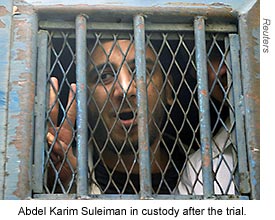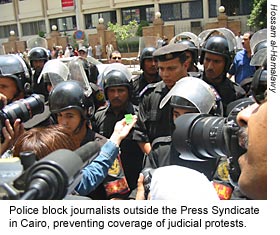
Egyptian blogger jailed for insulting Islam, Mubarak
New York, February 22, 2007—The Committee to Protect Journalists condemns an Egyptian court’s verdict sentencing an Egyptian Internet writer to four years in prison for his online criticisms. The case represents the first time that an Egyptian blogger has stood trial and been sentenced for his work. Abdel Karim Suleiman, who goes by the online…
Attacks on the Press 2006: Egypt
EGYPT The Egyptian Journalists Syndicate mounted a widespread campaign to pressure President Hosni Mubarak to fulfill a February 2004 promise to decriminalize press offenses. More than 20 newspapers went on strike for a day in July as part of the campaign, which many journalists credit with the last-minute deletion of a controversial amendment to the…

In Egypt, journalists under fire as protests continue
New York, May 25, 2006—The Committee to Protect Journalists is deeply concerned by attacks on the Egyptian press related to coverage of alleged election fraud and protests over judicial independence. The Egyptian state security prosecutor brought criminal charges on Wednesday against three journalists who alleged fraud in last year’s parliamentary elections. Security and police officers…
Attacks on the Press 2002: Egypt
Egypt’s position as one of the most politically influential countries in the Arab world ensures its press a prominent regional standing. The country boasts some of the best-known writers and commentators in the Middle East, and newspaper columnists often pointedly criticize government officials and policies. Nonetheless, Egyptian journalists know that some topics remain sensitive–criticism of…
Attacks on the Press 1999: Egypt
For the second consecutive year, President Hosni Mubarak’s government ignored vocal protests against the state’s use of criminal and libel laws to muzzle journalists. At least 11 reporters and editors were investigated or tried for libel and other alleged publications offenses. According to Egyptian human-rights organizations, dozens of criminal cases were pending against members of…
Egypt Briefing: Mubarak Puts the Press On Trial
On July 1, Egyptian President Hosni Mubarak met in Washington, D.C. with President Clinton-the Egyptian leader’s third such visit to the White House in the last four years. The scheduled meeting came at a time when Egyptian authorities stepped up their attacks against the country’s independent and opposition press.
Egypt Attacks on the Press
1999 February 7, 1999 Abbas al-Tarabili, Al-Wafd, LEGAL ACTION Muhammad Abdel Alim, Al-Wafd, LEGAL ACTION Between February 7 and February 8, al-Tarabili, co-editor in chief of the opposition daily Al-Wafd, and Abdel Alim, a reporter for the paper, were questioned by state security prosecutors on charges of “publishing false information to harm public interests, inciting public opinion,…